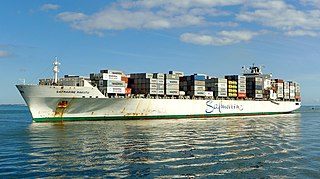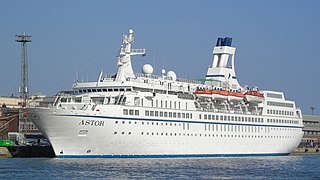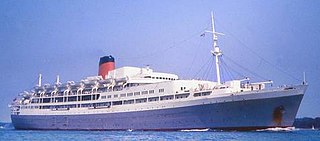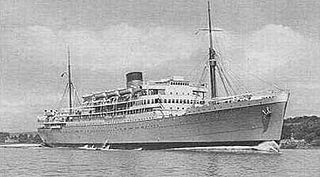
Kaiser Wilhelm der Grosse was a German transatlantic ocean liner named after Wilhelm I, German Emperor, the first monarch of the (second) German Empire.

MS Achille Lauro was a cruise ship based in Naples, Italy. Built between 1939 and 1947 as MS Willem Ruys, a passenger liner for the Rotterdamsche Lloyd, she was hijacked by members of the Palestine Liberation Front in 1985.

An ocean liner is a passenger ship primarily used as a form of transportation across seas or oceans. Liners may also carry cargo or mail, and may sometimes be used for other purposes.

The Union-Castle Line was a British shipping line that operated a fleet of passenger liners and cargo ships between Europe and Africa from 1900 to 1977. It was formed from the merger of the Union Line and Castle Shipping Line.

Safmarine is a South African international shipping business entity and former company offering container and break-bulk shipping services worldwide. It is now owned by its parent company Maersk Line.

RMS Empress of Britain was a steam turbine ocean liner built between 1928 and 1931 by John Brown shipyard in Scotland and owned by Canadian Pacific Steamship Company. She was the second of three Canadian Pacific ships named Empress of Britain, which provided scheduled trans-Atlantic passenger service from spring to autumn between Canada and Europe from 1931 until 1939.

RMS Windsor Castle was the largest passenger and cargo liner operated by the Union-Castle Line on its Cape Mail service between Britain and South Africa. Completed in 1960, the new Royal Mail Ship was notable for the high standard, if conservative, design of her public rooms in a "traditional" first class and "contemporary" tourist class configuration, which by clever arrangement, afforded both classes public rooms and open-deck areas facing forward and aft. The spacious passenger lounges and dining rooms were designed by eminent British architects. Windsor Castle was air-conditioned throughout the passenger and crew areas. Facilities included a fully equipped hospital, two outdoor swimming pools, a health spa and a theatre/cinema. A large amount of dry and refrigerated cargo space, cargo wine tanks and a specie (bullion) room, were also fitted.

RMS Transvaal Castle was a British ocean liner built by John Brown & Company at Clydebank for the Union-Castle Line for their mail service between Southampton and Durban. In 1966 she was sold to the South Africa-based Safmarine and renamed S.A. Vaal for further service on the same route. Following cessation of the service between the UK and South Africa in 1977 the ship was sold to Carnival Cruise Line and rebuilt in Japan as the cruise ship SS Festivale, re-entering service in 1978. In 1996 she was chartered to Dolphin Cruise Line and renamed IslandBreeze. In 1998 the ship was sold to Premier Cruise Line, which renamed her The Big Red Boat III. Following the bankruptcy of Premier Cruise Line in 2000, The Big Red Boat III was laid up until 2003 when she was sold to scrappers in Alang, India. She was renamed The Big Red Boat for her final voyage to the scrapyard.

HMS Pretoria Castle (F61) was a Union-Castle ocean liner that in the Second World War was converted into a Royal Navy armed merchant cruiser, and then converted again into an escort carrier. After the war she was converted back into a passenger liner and renamed Warwick Castle.

MS Astor was a cruise ship that most recently sailed for Cruise & Maritime Voyages' Transocean Tours subsidiary, under which she operated voyages to Europe, South Africa, and Australia.

RMS Pendennis Castle was a Royal Mail Ship, passenger and cargo liner operated by the Union-Castle Line. The vessel served 1959-1976 on a regular route between the UK and South Africa for the Southampton to Las Palmas, Cape Town, Port Elizabeth, East London and Durban "Cape Mail" service. After the vessel's disposal by Union-Castle, she was re-named consecutively Ocean Queen, Sinbad, then Sinbad I, however the ship did not return to commercial service.

Reina del Mar was a 20,334 GRT liner which was built by Harland and Wolff in 1955 for Pacific Steam Navigation Company (PSNC). It operated as a passenger liner from the United Kingdom to the western coast of South American until the early 1960s. The Reina del Mar was then a cruise liner that operated out of Southampton during the summer months and out of South Africa during the winter months. It was scrapped in 1975.

Furness Bermuda Line was a UK shipping line that operated in the 20th century. It was part of Furness, Withy and ran passenger liners between New York and the British Overseas Territory of Bermuda from 1919 to 1966.

SS New Australia was a UK-built turbo-electric passenger steamship that had a varied career from 1931 to 1966. She was built as the ocean liner Monarch of Bermuda, was a troop ship in the Second World War and was damaged by fire in 1947.

SS Queen of Bermuda was a British turbo-electric ocean liner that belonged to Furness, Withy & Co Ltd. Its Furness Bermuda Line subsidiary operated her between New York and Bermuda before and after the Second World War. During the war she served as first an armed merchant cruiser and then as a troop ship.
The RMS St Helena was a cargo liner operated by the St. Helena Shipping Company that operated between Britain and South Africa via the colony of Saint Helena during the late 20th century.

Edinburgh Castle was an ocean liner operated by the Union-Castle Line in service between Britain and South Africa during the mid 20th century.

Edinburgh Castle was a Union-Castle Line steam ocean liner and refrigerated cargo ship that was launched in 1910 and sunk in 1945. In peacetime she was in liner service between Great Britain and South Africa.

MS Ruahine was a passenger ship that operated in the mid-20th century, primarily for the New Zealand Shipping Company.

HMS Dunvegan Castle was a UK ocean liner that was converted into an armed merchant cruiser (AMC) in the Second World War. Harland and Wolff built her and her sister ship Dunnottar Castle in Belfast in 1936.




















